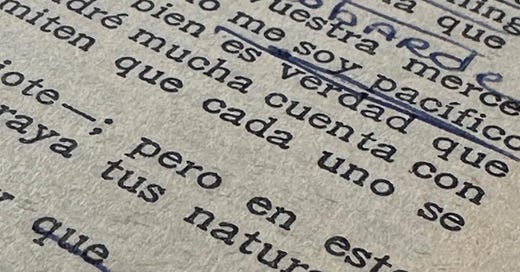When I was in high school, I was a pretty good student. I must admit, even though I was not very hard working, the education system suited my learning preferences. Memorization was deemphasized and there was a focus on understanding the whys and hows of what we were learning. I was able to get decent grades by just paying attention in class and doing homework, which was usually something like writing a paper or giving a presentation. Exams were often essay-based, even for my math classes, which meant I could earn points for having the wrong the answer if my reasoning was sound. (I’d bet you can guess how strong my math skills are 😅.)
However, French was a different story. I wasn’t getting the same scores in French that I was getting in other subjects. Weekly vocabulary quizzes, dictées, and performing dialogues in front of the class all required a level of memorization and controlled practice I wasn’t used to. This was a new problem for me, and I didn’t know what to do.
My parents were pretty hands-off when it came to schoolwork, but my mom, who was a Spanish teacher at my school, found out about my difficulties from her colleague. To save myself from a lecture about how I needed to work harder, I made the excuse that I didn’t know “how” to study French, so she showed me her method for Spanish.
She started by demonstrating how she reviewed vocabulary using flashcards. Then, she taught me how to record vocabulary in my notebook in two columns and create a quiz for myself by covering up one of the columns with scrap paper.
After just one 20-minute self-study session, I aced my next vocabulary quiz. After that, I was convinced I’d been using the wrong approach for learning French.
With this new technique, my scores improved, and the subject became more enjoyable. I was still lazy, but I got more out of my time and effort.
Different Strokes for Different Folks
I’ve seen this pattern with many of my English learners, but often in reverse. The Spanish education system tends to encourage rote learning, so many of my students rely too heavily on memorization. It’s not uncommon to find learners who can perfectly recite the list of irregular past verbs but struggle to tell you what they did yesterday.
That’s why it’s so important to reflect on how we learn. No single strategy works for every language, learner, or situation. Research shows that successful language learners know how to choose and combine strategies to suit a specific task. Ideally, we should all have a toolkit of strategies and take the time to evaluate which ones are most effective for our current level and context.
To help with this, I’m launching a free program called Fresh Foundations here on Substack in January. It’s not a boot camp or a high-pressure kick-starter course. Instead, it’s a series of simple, practical suggestions you can experiment with to ease into the new year. By the end of the program, you’ll have created a personalized plan that fits your current needs and helps you build a sustainable weekly language learning routine. Best of all, you’ll get practice with evaluating your learning, so you can make better choices about your strategies as you advance.
If you’re an intermediate learner of any language, this might be just what you need to refresh your approach and start the year off right. If you’re already subscribed, great!
If not, and this sounds interesting to you, consider subscribing.
Comment about the photo: Like I said, my mom was a Spanish teacher at my school. That’s actually why I chose to study French instead of Spanish when I was growing up-I didn’t want her to be my teacher! 😅
It’s ironic because I ended up moving to Spain and speaking much better Spanish than French. She died when I was 17, so I never got to speak to her in Spanish and I often wonder about her proficiency in the language. This photo is a close up of her copy of Don Quixote, with her annotations. Of course, it’s one of my prized possessions.







I can't wait to participate in the challenge 💯
I am a fantastic rote learner - so I try to avoid it at all costs in my language learning! It's very easy for me to learn a whole song or poem in Spanish and recite it word for word, and yet not know why I am saying what I am saying or how to apply it to what I want to say in real life situations. That said, I still haven't actually learned the best way for me to learn, so I will be paying attention to this!